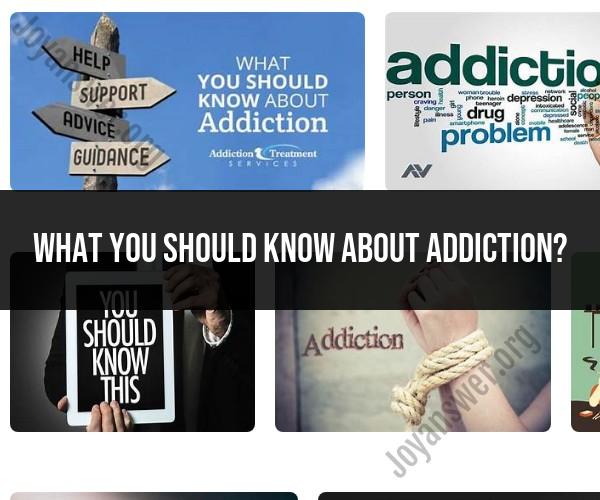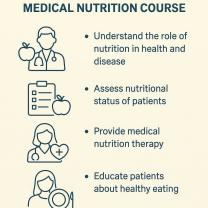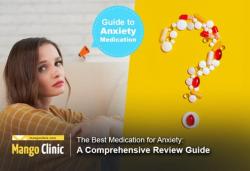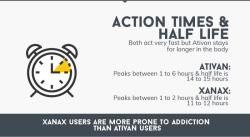What you should know about addiction?
Understanding addiction is crucial for individuals, families, and society as a whole. Here are some essential points to be aware of:
Addiction is a Complex Condition: Addiction is not a moral failing or a lack of willpower. It is a complex, chronic brain disease characterized by compulsive substance use or behaviors despite harmful consequences.
Substance and Behavioral Addictions: While substance use disorders, such as alcohol and drug addiction, are well-known, addiction can also involve behaviors like gambling, gaming, overeating, and even compulsive internet use.
Biological Basis: Addiction involves significant changes in the brain's reward and pleasure centers. Drugs and addictive behaviors can lead to the release of dopamine, which reinforces the behavior and makes it difficult to stop.
Genetic and Environmental Factors: Both genetic and environmental factors play a role in addiction. Some individuals may be more genetically predisposed to addiction, while environmental factors like stress, trauma, or peer pressure can contribute.
Tolerance and Withdrawal: People who are addicted often develop a tolerance, meaning they need more of the substance to achieve the same effect. When they try to quit or cut down, they may experience withdrawal symptoms.
Stages of Addiction: Addiction often progresses through stages, from initial use to dependence and addiction. Recognizing these stages can be helpful for early intervention.
Co-occurring Disorders: Addiction is often associated with mental health issues, and addressing both addiction and any co-occurring disorders is essential for successful treatment.
Treatment is Effective: Various treatment options are available, including therapy, medications (e.g., for opioid or alcohol addiction), and support groups. Treatment is effective, and many individuals recover with the right support.
Relapse is Common: Relapse is a part of the addiction and recovery process for many individuals. It doesn't mean failure, and continued support and adjustments to the treatment plan can help.
Prevention: Effective prevention strategies can reduce the risk of addiction, including education, awareness, and early intervention. Public health policies, such as restrictions on the sale of addictive substances, can also be effective.
Support and Empathy: Stigmatizing individuals with addiction can be counterproductive. Offering support, understanding, and empathy is vital to helping them seek and maintain recovery.
Harm Reduction: Harm reduction strategies focus on minimizing the negative consequences of addiction, even if abstinence is not immediately achievable. This approach includes providing clean needles, supervised injection sites, and education on safer substance use.
Continued Research: The field of addiction research is ongoing, with researchers exploring new treatments, understanding the impact of emerging substances, and studying the genetics and neurobiology of addiction.
Understanding addiction is an ongoing process, and staying informed and compassionate is essential for addressing this significant public health issue. It's crucial to approach addiction as a medical condition rather than a moral failing and to promote policies and initiatives that prioritize prevention, treatment, and support for those affected by addiction.
What You Should Know About Addiction: A Comprehensive Overview
Addiction is a chronic disease that is characterized by compulsive drug use or engagement in certain activities despite negative consequences. It can have a devastating impact on a person's health, relationships, and career.
Addiction is a complex disease with no single cause. It is thought to be caused by a combination of genetic, environmental, and psychological factors. Some people are more genetically predisposed to addiction than others, and certain environmental factors, such as exposure to drugs at a young age or trauma, can increase the risk. Psychological factors such as impulsivity and difficulty coping with stress can also play a role.
Addiction is not a choice. Once a person becomes addicted, they have difficulty controlling their cravings and use of drugs or alcohol, even when they know it is harming them.
Addiction is treatable. There are many effective treatments available, including medication-assisted treatment, behavioral therapy, and support groups. With treatment, many people with addiction are able to achieve long-term recovery.
Understanding the Science and Psychology of Addiction
Addiction is a complex disease that involves multiple brain regions and circuits. When someone uses drugs or alcohol, the brain releases dopamine, a neurotransmitter that produces feelings of pleasure and reward. Over time, repeated use of drugs or alcohol can lead to changes in the brain's reward system, making it more difficult to experience pleasure from other activities and more likely to crave and use drugs or alcohol.
Addiction can also lead to changes in other brain regions and circuits, including those involved in learning, memory, decision-making, and impulse control. These changes can make it difficult for people with addiction to stop using drugs or alcohol, even when they know it is harming them.
Types of Addiction and Common Risk Factors
There are many different types of addiction, including substance use disorders (addiction to drugs or alcohol) and behavioral addictions (addiction to gambling, gaming, sex, etc.).
Some common risk factors for addiction include:
- Genetics
- Exposure to drugs or alcohol at a young age
- Trauma or abuse
- Mental health conditions such as depression or anxiety
- Social pressure to use drugs or alcohol
- Impulsivity
- Risk-taking behavior
- Difficulty coping with stress or negative emotions
Seeking Help and Support for Addiction Recovery
If you are struggling with addiction, there are many resources available to help you. The first step is to talk to a doctor or mental health professional. They can assess your situation and help you develop a treatment plan.
There are also many different types of support groups available for people with addiction and their loved ones. These groups can provide a safe and supportive space to share your experiences, learn from others, and find encouragement on your recovery journey.
Navigating the Challenges and Successes of Overcoming Addiction
Overcoming addiction is a challenging but rewarding process. It is important to be patient with yourself and to remember that recovery is not linear. There will be setbacks along the way, but it is important to keep moving forward.
Here are some tips for navigating the challenges and successes of overcoming addiction:
- Find a support system. Having people who care about you and believe in you can make a big difference in your recovery.
- Be patient with yourself. Recovery takes time. Don't expect to be perfect overnight.
- Celebrate your successes. No matter how small, every step you take towards recovery is a victory.
- Don't be afraid to ask for help. If you are struggling, reach out to your doctor, therapist, or support group.
Remember, you are not alone. Millions of people struggle with addiction, and there are many resources available to help you recover.













